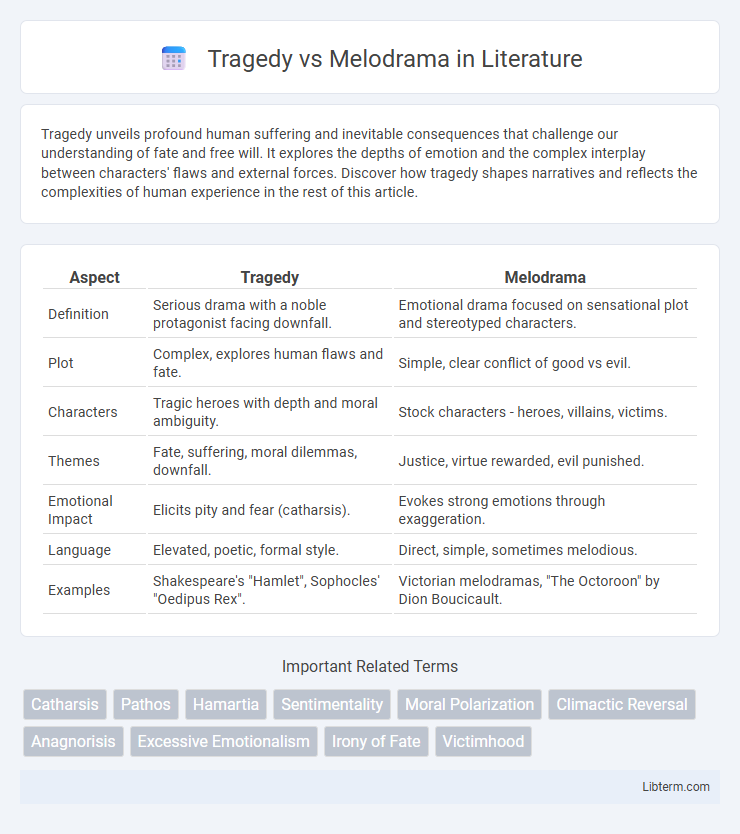Tragedy unveils profound human suffering and inevitable consequences that challenge our understanding of fate and free will. It explores the depths of emotion and the complex interplay between characters' flaws and external forces. Discover how tragedy shapes narratives and reflects the complexities of human experience in the rest of this article.
Table of Comparison
| Aspect | Tragedy | Melodrama |
|---|---|---|
| Definition | Serious drama with a noble protagonist facing downfall. | Emotional drama focused on sensational plot and stereotyped characters. |
| Plot | Complex, explores human flaws and fate. | Simple, clear conflict of good vs evil. |
| Characters | Tragic heroes with depth and moral ambiguity. | Stock characters - heroes, villains, victims. |
| Themes | Fate, suffering, moral dilemmas, downfall. | Justice, virtue rewarded, evil punished. |
| Emotional Impact | Elicits pity and fear (catharsis). | Evokes strong emotions through exaggeration. |
| Language | Elevated, poetic, formal style. | Direct, simple, sometimes melodious. |
| Examples | Shakespeare's "Hamlet", Sophocles' "Oedipus Rex". | Victorian melodramas, "The Octoroon" by Dion Boucicault. |
Defining Tragedy and Melodrama
Tragedy is a dramatic genre characterized by the downfall of a noble protagonist due to a fatal flaw or unavoidable fate, often evoking catharsis through themes of human suffering and moral complexity. Melodrama emphasizes exaggerated emotions, clear moral distinctions between heroes and villains, and sensational plotlines designed to evoke strong audience reactions. Both genres differ fundamentally in narrative structure and emotional impact, with tragedy focusing on profound existential dilemmas and melodrama on overt emotional appeals.
Historical Roots of Tragedy
Tragedy originated in ancient Greek theatre, deeply rooted in religious rituals honoring Dionysus, emphasizing human suffering and moral dilemmas. Classical tragedians like Aeschylus, Sophocles, and Euripides crafted narratives centered on fate, hubris, and catharsis, shaping tragedy's enduring themes. Unlike melodrama, which developed later with exaggerated emotions and clear moral distinctions, tragedy focuses on complex characters and profound ethical questions grounded in historical and philosophical contexts.
The Origins of Melodrama
Melodrama originated in the late 18th century as a theatrical form blending music and drama to heighten emotional appeal, distinguishing it from classical tragedy's focus on profound moral conflicts and complex character development. Early melodramas employed exaggerated characters and sensational plots to captivate audiences, emphasizing clear moral distinctions between good and evil. This genre evolved as a popular entertainment form during the 19th century, influencing modern storytelling through its emphasis on emotional manipulation and spectacle.
Core Themes in Tragedy
Core themes in tragedy center on human flaws, fate, and moral conflict, often highlighting the inevitability of suffering and downfall despite noble intentions. Tragedies explore profound questions of existence, justice, and the consequences of hubris, emphasizing catharsis through emotional release and reflection. These themes distinguish tragedy from melodrama, which typically prioritizes clear-cut emotions and moral polarization over complex philosophical dilemmas.
Common Motifs in Melodrama
Melodrama frequently features motifs such as clear moral dichotomies, where protagonists embody virtue and antagonists represent evil, enhancing emotional engagement. Common themes include exaggerated conflicts, sensational events, and the triumph of good over evil, often portrayed through melodramatic music and heightened dialogue. Recurring motifs like mistaken identities, secret villains, and virtuous heroines reinforce the genre's focus on emotional appeal and moral clarity.
Characterization: Heroes vs. Victims
Tragedy often portrays heroes as complex characters wrestling with fate, moral dilemmas, and inner flaws, highlighting their noble qualities despite inevitable downfall. Melodrama emphasizes victims who face external conflicts and exaggerated emotions, portraying clear distinctions between good and evil. This contrast in characterization drives tragedy's depth and melodrama's emotional appeal, shaping audience engagement through heroism or victimization.
Emotional Impact: Catharsis vs. Sensationalism
Tragedy evokes deep emotional catharsis by portraying complex characters facing inevitable misfortunes, allowing audiences to experience profound reflection and empathetic sorrow. Melodrama prioritizes sensationalism through exaggerated emotions and clear moral contrasts, aiming to elicit immediate and intense feelings such as excitement or outrage. The emotional impact of tragedy is transformative and introspective, whereas melodrama seeks to entertain by amplifying emotional reactions without fostering deeper understanding.
Narrative Structure: Fate and Conflict
Tragedy often centers on fate as an unavoidable force shaping the protagonist's downfall, with conflicts emerging from internal flaws or external destiny. Melodrama emphasizes clear moral distinctions, where conflicts arise from external antagonists and emotional struggles rather than fate. The narrative structure in tragedy follows a cause-and-effect chain leading to inevitable catastrophe, while melodrama prioritizes heightened emotions and moral resolutions.
Audience Response to Tragedy and Melodrama
Audience response to tragedy often involves deep emotional catharsis as viewers confront complex human flaws and inevitable fate, fostering empathy and introspection. In contrast, melodrama typically elicits heightened emotional engagement through clear moral distinctions and sensationalized conflicts, encouraging viewers to root for virtuous characters and experience intense feelings of justice or outrage. Both genres engage audiences powerfully but differ in psychological impact, with tragedy prompting reflective sorrow and melodrama driving passionate involvement.
Tragedy and Melodrama in Contemporary Media
Tragedy in contemporary media often explores complex human flaws and moral dilemmas, emphasizing character depth and inevitable suffering, as seen in works like "Breaking Bad" and "The Handmaid's Tale." Melodrama, by contrast, prioritizes heightened emotions, clear moral distinctions, and sensational plot devices, common in soap operas and reality TV shows such as "The Young and the Restless" and "The Bachelor." Both genres shape audience engagement through distinct narrative techniques, where tragedy evokes reflection on existential themes while melodrama capitalizes on emotional intensity and spectacle.
Tragedy Infographic

 libterm.com
libterm.com